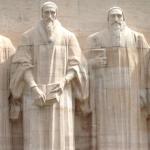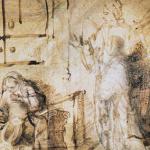Some of the most passionate passages of the Old Testament are lamentations over Moab (Isaiah 15-16; Jeremiah 48). Why so much space and energy for a relatively obscure nation? We can find the reason by glancing at the history of Moab. Philistia is better known, but Moab is actually more intimately linked to Israel.
Moab was a son of Lot, Abraham’s nephew, born to Lot in the cave above Zoar after the destruction of Sodom and Gomorrah his eldest daughter who seduced him after making him drunk with wine (Genesis 19:30-38).
Not only is Moab related to Abraham by blood, but the story of Lot and his daughters anticipates the later story in Genesis about Judah and Tamar, a daughter-in-law who plays a harlot to get a child by her father-in-law (Genesis 38). Judah had twin sons with Tamar, Perez and Zerah, as Lot had two sons by his two daughters, his sons/grandsons Moab and Ammon. The history of Moab and Ammon is a mirror of the history of Judah, of the sons Perez and Zerah.
Moab is the Gentile Judah, not a scepter, but at least a washpot in Yahweh’s house (Psalm 60:8; 108:9). Moab runs parallel to Judah; Moab also runs parallel to Sodom, her city of origin, the original inhospitable, sexually perverse city.
The Moabites settled on the east side of the Jordan, and they were there when Israel came up out of Egypt. Moab refused to bring out food and water when Israel was passing through, and for that failure of hospitality Yahweh excluded Moabites and Ammonites from the assembly of Israel for ten generations, excluded them from His hospitality for a period of time (Deuteronomy 23:3-4).
Here again Moab runs parallel to Judah, since bastards like Perez and Zerah are also excluded from the assembly of Israel for ten generations (Deuteronomy 23:2).
Moab didn’t merely refuse hospitality, but deliberately tried to stop Israel’s march through the wilderness toward Canaan. Balak was a Moabite king, and he hired Balaam to curse Israel (Numbers 22-24). When that failed, Balaam sent Moabite and Midianite women into the camp of Israel to seduce the men and to entice them to worship idols. Yahweh broke out in anger and sent a plague that was stopped only by Phinehas, who impaled a fornicating couple with a spear (Numbers 25).
For all her checkered past, Moab does not remain outside Israel. In Ruth, we get a taste of Moab’s redemption. Through her, Moab is partially reincorporated to the Abrahamic people. Ruth acts a lot like the mother of Moab. Like the daughter of Lot, she approaches a man who is old enough to be her father, who is sleeping, who is joyful with wine, and asks him for marriage and children (Ruth 3).
Close as the resemblance between Ruth and Moab’s mother is, Ruth is reversing the incest that began the history of Moab. By approaching Boaz on the threshing floor, Ruth forces her way into the genealogy of Israel: Boaz’s God becomes her God, Boaz’s people are her people, Boaz’s descendants, including David and David’s great Son, become her descendants. It is not an accident that David conquers Moab and makes it part of “greater Israel” (2 Samuel 8). David has Moabite blood in his veins; and so does Jesus.
Moab’s early history anticipates Judah’s, but in Ruth, Moab’s history becomes Judah’s. Moab, the child of the seducer, the child of incest, the inhospitable child of the daughter of Sodom, is redeemed and quite literally incorporated into David, incorporated, blood and flesh, into the body of Christ.
This history helps us see why Isaiah and Jeremiah are so distressed over the pride and the destruction of Moab: Moab’s destruction is like lopping off an limb of David. Isaiah 15-16 depicts the wailing and mourning over Moab in appalling detail. The cities of Moab are ruined in a single night (15:1), and all across Moab the cities are filling with mourning (15:3-4).
City after city is listed, and everywhere it is the same: Crying and mourning. Weeping and wailing fill the land, echoing from one end to the other. In every city, wailing comes from the streets, the rooftops, the squares (15:3). Heads are shaved and beards cut off as the Moabites are taken into slavery, off to the “brook of the willows,” the Euphrates (15:7; cf. Psalm 137:2). The green land withers, the vineyards are trampled, the fields destroyed (15:6; 16:8, 10). There is neither grain nor grapes, neither bread nor wine for Moab. Moab suffers Egyptian plagues, with her waters turning to blood (15:9). But her wails and cries are useless. Moabites go up to their high places to weep, but there is no answer (15:2). Moabites go into the sanctuary to pray, but they get no relief (16:12).
But Moab has reason for hope. The destruction and exile that Isaiah describes comes to pass in the Babylonian invasion that carries Judah off. Moab has participated in Judah’s history and glory; Moab will participate also in Judah’s removal from the land. And if Moab participates in Judah’s death, she will also share in his resurrection.
In the midst of desperation and lament, one voice stands above the rest (Isaiah 15:5; 16:9-12). Suddenly in the middle of chapter 15, someone begins speaking in the first person, an “I.” The identity of that figure is ambiguous in chapter 15, but in chapter 16, it becomes clear that the mourner is Yahweh Himself. The mourner is the same one who “made the shouting to cease” (16:11).
The same God who causes all the wailing and weeping and mourning, the same God fills Moab with cries that echo from one end of the land to the others, who clothes Moab with sackcloth and silences her shouts and songs – that same God becomes the Chief Mourner in Moab.
Yahweh is sovereign, the ruler of the nations. Isaiah is one of the primary biblical witnesses to that truth. But He is not a distant tyrant, an absentee ruler, who watches indifferently or gleefully as nations are filled with terror, as their worlds come crashing down around them. He is the sovereign Ruler of the nations, but He is also among the nations, who wails and mourns over her destruction.
And if Yahweh laments for Moab, He will also lament over Israel. And if He laments for Moab and Israel in the old world, He mourns with His people even more intensely in the new. The new covenant immeasurably deepens the Lord’s share in our sorrow.
For in the new covenant, the Lord of all becomes man, suffers everything that we suffer yet without sin, feels the full force and burden of death and loss, weeps at the grave of Lazarus. Jesus wept, but if we have seen Jesus we have seen the Father. Jesus lamented over Jerusalem, the city that would be thrown down at the coming of the Son of Man; and if we have seen Jesus, we have seen Yahweh.
And now Jesus has given us His Spirit of adoption by which we cry Abba, Father, who helps us in our weakness, who intercedes for us with groans too deep for speech. When we mourn for our sins, when we mourn over the mess that our sins produce, when we lament over the ruin of the world, when we mourn our loss, when we face a crisis for which there seems to be no resolution, when we in desperation we determine that we simply cannot go on, when we feel entirely alone and are sure that no one hears – no matter what, our voice is not alone.
Another voice rises like a descant over our sorrow, the voice of the Son and the voice of the Spirit, who weeps bitterly, who drenches us with tears that water our dry ground, whose heart intones like a harp.
When our hearts melt, God’s heart melts too. And by His groans we are healed.












